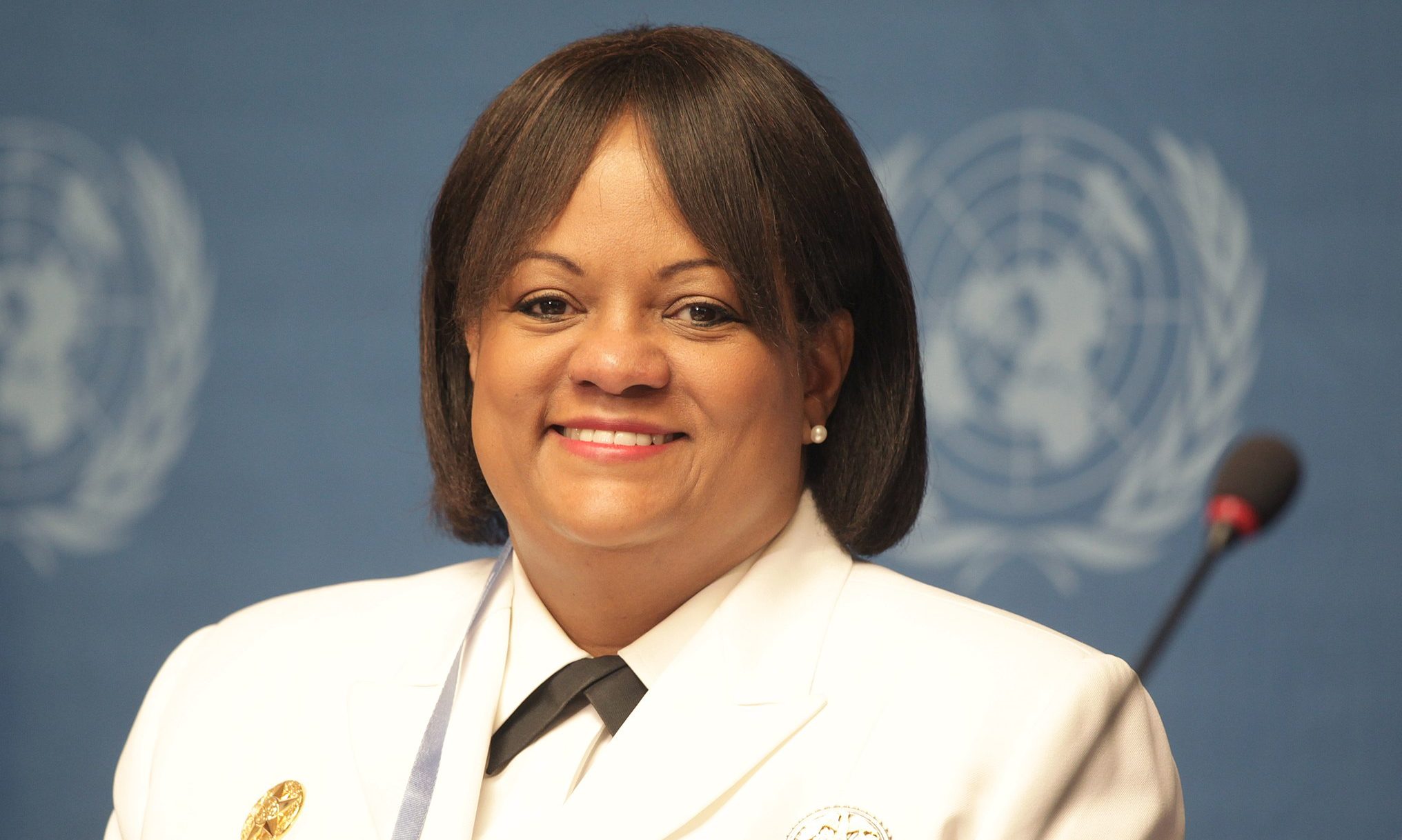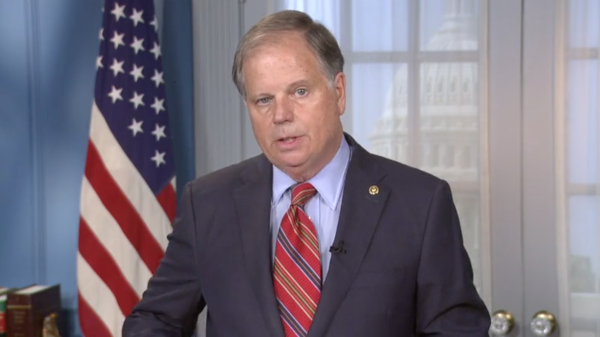Former U.S. Surgeon General Dr. Regina Benjamin said Thursday that attempts to lift stay-at-home restrictions prematurely and without the appropriate level of testing and contact tracing could be like walking out into the eye of a hurricane before the storm has truly passed.
“We have no idea what we’re dealing with because this a new virus. And if we’re going to open back up, we need to know,” said Benjamin, who served as U.S. surgeon general from 2009 to 2013. She runs a nonprofit medical clinic in Bayou La Batre, Alabama, has also served as a vice admiral in the U.S. Public Health Service Commissioned Corps.
As of Thursday afternoon, more than 5,700 cases of the virus have been confirmed by lab tests in the state, but experts agree that the number of confirmed cases is an undercount because of limited access to testing and a high number of people who show no symptoms or are pre-symptomatic but still infected and able to spread the virus.
[visual-link-preview encoded=”eyJ0eXBlIjoiaW50ZXJuYWwiLCJwb3N0Ijo4MzEwOSwicG9zdF9sYWJlbCI6IlBhZ2UgODMxMDkgLSBNYXBwaW5nIENPVklELTE5IGluIEFsYWJhbWEiLCJ1cmwiOiIiLCJpbWFnZV9pZCI6ODU1MjMsImltYWdlX3VybCI6Imh0dHBzOi8vd3d3LmFscmVwb3J0ZXIuY29tL3dwLWNvbnRlbnQvdXBsb2Fkcy8yMDIwLzA0L0FydGJvYXJkLTEtMTAwMHg2MDAuanBnIiwidGl0bGUiOiJNYXBwaW5nIENPVklELTE5IGluIEFsYWJhbWEiLCJzdW1tYXJ5IjoiT3VyIGRhdGEgZGFzaGJvYXJkIGhhcyB0aGUgbW9zdCB1cC10by1kYXRlIG51bWJlcnMgYW5kIGFuYWx5c2lzIG9uIHRoZSBkYXRhLiIsInRlbXBsYXRlIjoidXNlX2RlZmF1bHRfZnJvbV9zZXR0aW5ncyJ9″]
“We know what hurricanes are like, and when we talk about opening things back up, we know you don’t go out into the eye of the storm,” Benjamin said. “We know that the weather can be better. You can even have sunshine. But right now, we don’t know if the storm has passed by, or if we’re just going through the eye.”
The number of new confirmed cases per day in Alabama declined over the past week before picking back up in the last three days. As of 1 p.m., more than 133 new cases have been confirmed Thursday. Both Tuesday and Wednesday saw increases of more than 249 cases or more. The largest daily increase so far was on April 9 when 339 cases were confirmed.
The White House’s gating criteria in its recommendations for a phased reopening call for at least 14 days of a “downward trajectory” in new confirmed cases along with robust testing.
Benjamin said the only way to know the true extent of the outbreak and whether it has been brought under control is through mass testing. Over the past week, the number of new tests performed per day has also declined, according to APR’s analysis of data published by the Alabama Department of Public Health. The number of new tests per day based on a 5-day average has declined in both absolute terms and as a percentage of the total number of tests.
{{CODE1}}
“The only way we’re going to know is through testing, and more testing and more testing,” Benjamin said. “We’ve tested less than 1 percent of our state. So we have no idea what we’re dealing with.”
Experts who spoke with APR earlier this week, including Alabama Hospital Association President Dr. Donald Williamson and Dr. Jodie Dionne-Odom from UAB, agreed that the state must expand testing and contact tracing before the state can safely reopen. A study from the Harvard Global Health Institute recommended that states should perform at least 152 tests per day per 100,000 by May 1 to be able to safely reopen. The authors of that study said the recommendation is conservative and more testing would likely be needed.
Alabama is far below the number of tests per day needed to meet the Harvard criteria. The state would need to roughly triple the number of tests it performs per day to be able to meet that criteria.
Gov. Kay Ivey and State Health Officer Scott Harris said Tuesday that Alabama needs to be able to test a larger percentage of the population before the state can be fully reopened, and Ivey said her decision to reopen would be based on data — not dates. “We’re not testing enough yet. We’re a little bit less than 1 percent of our population, and we need to do a whole lot more testing to get up to speed,” the governor said Tuesday.
A shortage of testing supplies — namely swabs, reagents and the resources used to transport swabs to labs for testing — has hampered Alabama’s ability to widely expand testing. Officials have said federal seizures of some supplies slowed the effort early on. Since then, availability has improved, but the state still has not been able to get the supplies it needs to drastically expand testing.
The state’s Department of Public Health continues to work with university and commercial testing labs to increase capacity, Harris has said. “We continue to try to get them to amplify their capacity as much as possible,” Harris said.
Sen. Doug Jones said during a press conference Thursday that $25 billion has been included in the latest coronavirus response package to bolster testing across the country. It’s not clear how that money will trickle into Alabama, but he said he hopes it will be able to expand the availability of supplies for the state.
“The economy is going to come back but it’s going to be slow to come back,” Jones said, urging the Senate to take up more bills he has supported to provide a safety net for businesses and workers affected by the shutdown. “We’ve got to do more testing as the governor has said. We’ve got to get this done in a safe and healthy way, but this will give businesses the security that they need in order to try to open up safely and give both the businesses and the workers that cushion for the next few weeks, and maybe the next few months.”
Ivey’s decision to remain closed for now stands in contrast to decisions in other Republican-controlled southern states like Georgia and South Carolina, where officials there have keen to restart economies as quickly as possible. Georgia Gov. Brian Kemp’s decision to reopen parts of the economy starting in the next few days drew criticism even from President Donald Trump, who said the state was opening too soon and had not met the White House’s criteria for reopening.
Part of Kemp’s plan is to reopen barbershops and salons. Some in Alabama, including Lt. Gov. Will Ainsworth’s small business committee, have called for the same to be done in Alabama. Benjamin said Thursday that close-contact businesses like salons, barbershops, nail salons and spas are of particular concern because it’s difficult to maintain any physical distance.
“The concern I have as a doctor is that when we look at hair salons and places like that, we’re putting those individuals’ lives at risk — the operators, the shampoo person. Their lives are being at risk, as well as their families back home,” Benjamin said. “And then the customers themselves are also at risk. And so that’s my biggest concern there. It’s not knowing, because we don’t have the testing whether you have it or not, and your ability to socially distance.”
Benjamin also raised concerns about some who are calling for some parts of the state to reopen while others remain under shelter-in-place or stay-at-home orders. She warned that the virus does not respect man-made boundaries.
“I think it’s like hurricanes again,” Benjamin said. “It doesn’t know the boundaries, it doesn’t know state boundaries, it doesn’t know counties, it goes where it goes.”
She pointed to the example of Jefferson County, which issued shelter-in-place-style restrictions early one, and saw its confirmed cases slow. Meanwhile, in Mobile, where no stay-at-home order was issued until weeks later, their number of confirmed cases has been rising much faster, particularly over the past two weeks as testing has expanded somewhat. Mobile now has the most confirmed cases in the state, but a smaller percentage of its population has been tested compared to Jefferson County.
“If we look at in the beginning, when we started socially distancing, Birmingham, for example, came online much faster and started putting in place shelter in place and those sorts of things much faster than Mobile,” Benjamin said. “Mobile’s numbers are much higher. Just those couple of days and a couple of weeks of socially distancing equates to people’s lives. And so, if we can give it a few more weeks, a couple more days, we may save a few more lives.”























































